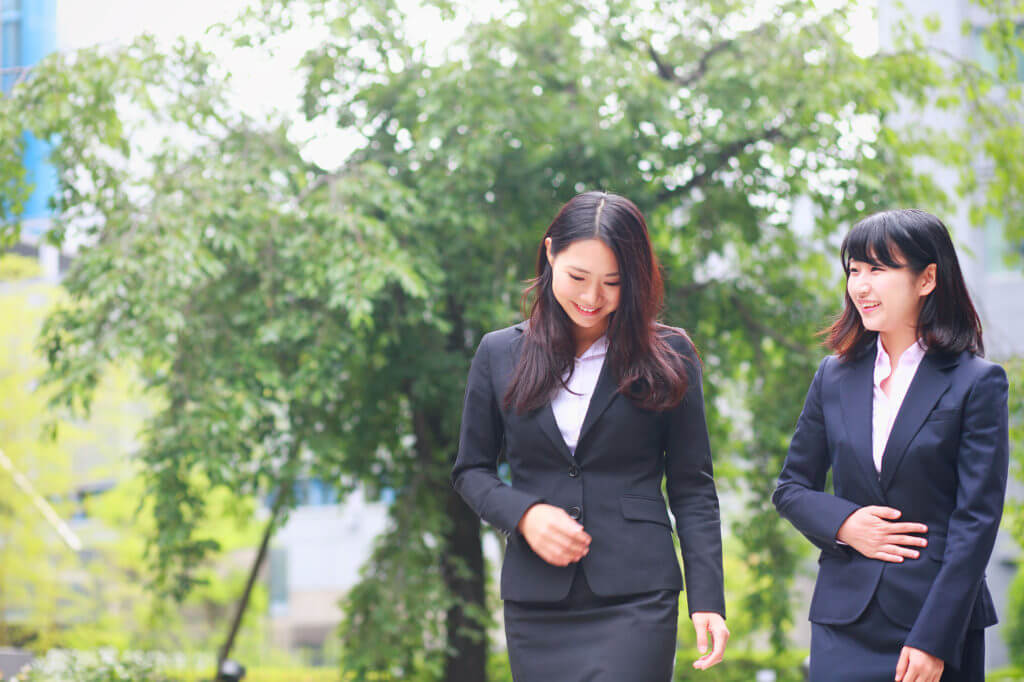
Deciding what to wear to work or an interview can be stressful. You might be worried about your clothing or accessories giving off a bad impression. You might be particularly anxious about dressing for work in Japan because you’ve heard that many workplaces have strict dress codes. While corporate workers in Japan often wear conservative suits that don’t allow them to express much individuality, dress codes vary by industry. Retail workers, teachers, and restaurant staff don’t dress as formally as businesspeople do. Other workers, such as public transport and bank staff, have uniforms and don’t have to decide what to wear to work every day. People in the fashion and entertainment industry are often given the freedom to dress as colorfully and creatively as they wish. Thinking about tailoring your outfit to the industry you work in might have you a bit more stressed, but don’t worry! We’re here to help! Here’s a what to wear guide to help you get dressed in almost any Japanese workplace.
In some industries, you don’t have to worry very much
The stereotypical dark colored business suit might be a staple in the Japanese corporate world, but it isn’t a requirement in every industry. In fashion and beauty related settings, it’s common to see workers dressed in very casual clothing. Some may even have tattoos. The music and entertainment industry is also quite laid back when it comes to dress codes. In fact, failing to dress in a stylish, creative way may leave a bad impression. Fashion and entertainment aren’t the only places where people dress a bit more casually. While they still have to appear professional, teachers often opt for business casual instead of a full suit. Elementary or nursery school teachers might dress even more casually. In addition, many retail workers can be seen wearing their store’s clothing or other everyday streetwear.

Interviews
The clothing people wear to interviews in Japan is often much more formal than the clothing they’ll wear to their jobs. Even when applying to work in a restaurant or as a hairdresser, it’s best to wear business casual. For more formal, corporate settings, wearing a “recruit suit” is common. These suits are usually purchased by recent college grads, but some foreigners and older job seekers also wear them while job hunting. A “recruit suit” usually consists of a plain black suit with a white shirt and black shoes. While patterns, accessories, and other individual touches to your outfit should be avoided when looking for a corporate job, you’re likely to have a bit more freedom once you start working.
Many places have uniforms
At many workplaces in Japan, you won’t have to worry about what you’re going to wear to work everyday because you’ll be given a uniform. People who work in banks, the post office, hospitals, public transport, and various other settings wear uniforms. Wearing a uniform is seen as a symbol of professionalism and is preferred by many employers and even some employees. In addition to looking professional, uniforms provide a sense of unity and cohesiveness in a workplace. If you’re smaller or larger than the average person in Japan, you might be worried about how a uniform will fit. If standard sizes don’t work for you, most employers will order one custom made for you, so there’s no need to fret. And if you’re wondering what to wear until you get to work and change into your uniform, casual but neat streetwear is usually appropriate.

In the past, it was common for women to be required to wear a skirt and heels as part of their uniform. Nowadays, more and more companies are giving women the freedom to choose between pants or a skirt and wear flat shoes. These changes are largely thanks to the #KuToo movement, which was started by Yumi Ishikawa, a woman who was tired of being required to wear heels at work. In addition to starting the movement, Ishikawa submitted a petition to the Ministry of Health, Labor, and Welfare in an effort to advocate for a law that would prohibit workplaces from mandating heels. While the law has yet to pass, corporations have started making changes in response to the movement. For example, Japan Airlines debuted new uniforms allowing women to choose more comfortable clothing and shoes in April 2020.
Corporate Settings
Corporate settings in Japan are where the image of the stereotypical worker in Japan comes from. Suits worn by businesspeople are usually a dark color, such as black, grey, or navy. In summer, beige might be acceptable at some companies. Men are usually expected to wear ties. Both genders are expected to carry a plain black or brown business bag that is large enough to hold documents. Like with uniforms, women were required to wear skirts and heels in the past, but can opt for pants and more comfortable shoes these days. If you are a woman who wants to wear a skirt in a Japanese corporate setting, make sure it isn’t too short or tight.

Makeup, Hair, and Accessories
Unfortunately for those who like to go bare faced, not wearing makeup is seen as unprofessional in Japan. While heels might be on their way out, makeup is still here to stay. Makeup in most Japanese workplaces is expected to look natural. Hair is also expected to look natural, which means having black hair for Japanese people. Some companies even expect Japanese people who have naturally brown hair to dye it black. This rule usually doesn’t apply to foreigners, who are allowed to keep their natural blonde, red, or brown hair. Foreign workers can even get away with dying their hair as long as it’s not an unnatural shade. Accessories, like hair and makeup, shouldn’t be flashy or draw attention to you. Wearing thin, small rings or dainty necklaces is acceptable. Even workplaces where business casual or streetwear is acceptable expect employees not to have flamboyant hair, makeup, or accessories. Of course, in fashion and entertainment industry workplaces, you can be more colorful and creative.


